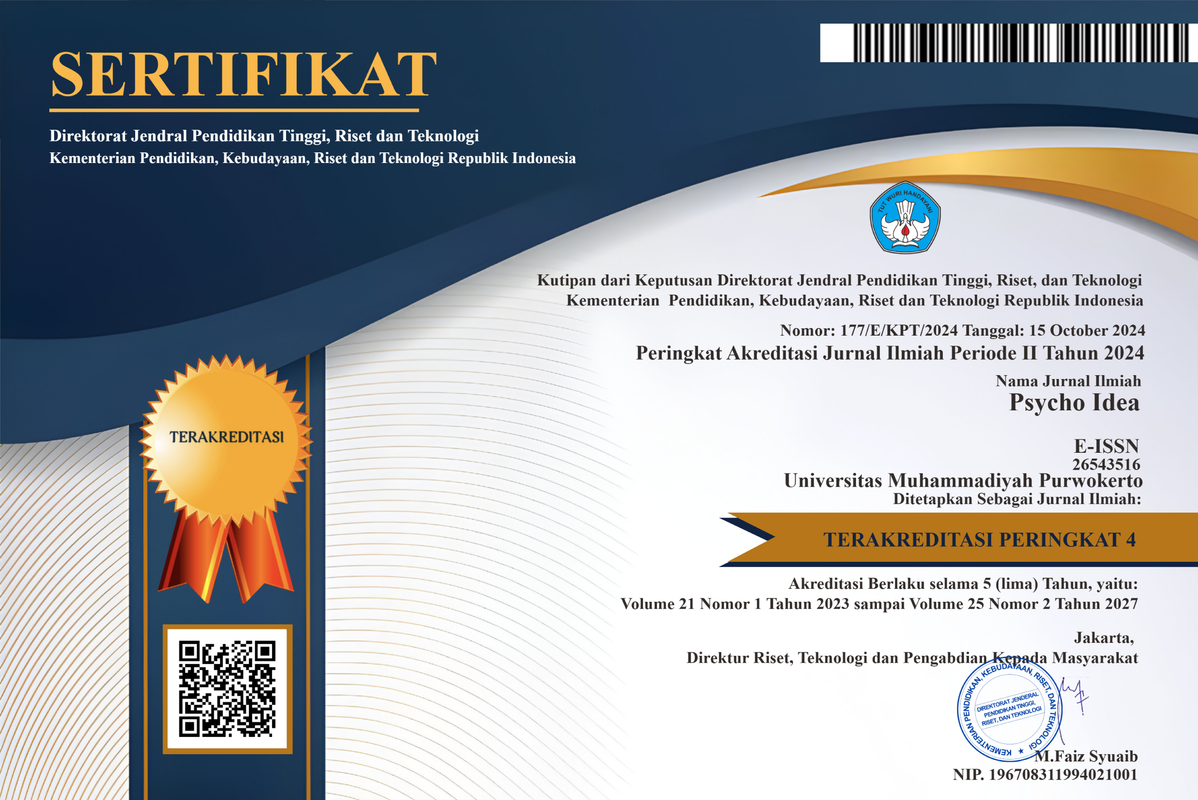Citra Diri terhadap Kecenderungan Hedonistic Lifestyle pada Mahasiswa
DOI:
https://doi.org/10.30595/psychoidea.v19i1.6064Keywords:
hedonistic lifestyle, self-image, studentsAbstract
Hedonistic lifestyle is a lifestyle that is intended for pleasure seeking, one of the factors that influence is self image. The tendency of hedonistic lifestyle in students is intended to show identity, personal personality, and the formation of characteristics so as to create good interpersonal relationships and facilitate social interaction. The purpose of this study was to determine the effect of self-image on the tendency of hedonistic lifestyle, the level of hedonistic lifestyle, and the image of self-image in students. This study uses a quantitative method of causal relationships with the sampling technique used is cluster sampling of 348 students. The scale used is a Likert scale with the results of the validity and reliability test is overall valid and reliable. The results of the analysis state that there is an influence between the two variables with a significance coefficient of 0.573> 0.05. The analysis test results showed that there was a significant positive relationship between self-image and hedonistic lifestyle. Descriptive hedonistic lifestyle test results showed high categories (50.9%), low (49.1%), self-image showed high categories (50.6%), low (49.4%). Descriptive test results showed no differences in terms of gender, age but there were differences in terms of allowance.References
Andarwati, L. (2016). Citra Diri Ditinjau Dari Intensitas Penggunaan Media Jejaring Sosial Instagram Pada Siswa Kelas XI SMA N 9 Yogyakarta. E-Jurnal Bimbingan dan Konseling Edisi 3 Tahun Ke-4, 1-12.
Apsari, L., Mayangsari, M. D., & Erlyani, N. (2016). Pengaruh Perilaku Modeling Pada Tayangan Drama Korea Terhadap Citra Diri Remaja Penggemar Drama Korea. Jurnal Ecopsy Vol 3 No 3, 144-148.
Falth, L., Svensson, I., Carlsson, S., & Gustafson, S. (2014). Self Image and Reading Development: The Effect of Self Image on Reading Development among Pupils in Grade 2. The Online Journal of Counseling and Education Vol 3 No 4, 17-34.
Fatimah, S. (2013). Hubungan Antara Kontrol Diri dengan Kecenderungan Gaya Hidup Hedonis Pada Mahasiswa di Surakarta. NASKAH PUBLIKASI Fakultas Psikologi Universitas Muhammadiyah Surakarta, 1-15.
Komariyah, F. N. (2012). Hubungan Antara Persepsi Gaya Hidup Fashion dengan Citra Diri Pada Komunitas Hijabers di Surakarta. Naskah Publikasi, Fakultas Psikologi Universitas Muhammadiyah Surakarta, 11.
Nurvitria, A. L. (2015). Pengaruh Gaya Hidup Hedonis Terhadap Perilaku Pembelian Impulsif Pada Mahasiswa Jurusan PPB 2013 FIP UNY. e-journal Bimbingan dan Konseling Edisi 11 Tahun ke-4, 1-10.
Purnamasari, A., & Agustin, V. (2018). Hubungan Citra Diri dengan Perilaku Narsisme Pada Remaja Putri Pengguna Instagram di Kota Prabumulih. Jurnal Psibernitika Vol 11 (2), 115-132.
Sartika, Y. D., & Hudaniah. (2018). Gaya Hidup Hedonis Dan Intensi Korupsi Pada Mahasiswa Pengurus Lembaga Intra Kampus. Jurnal Ilmiah Psikologi Terapan Vol 06, No 02, pISSN: 2301-8267, eISSN: 2540-8291, 213-231.
Setyaningsih, S. S. (2013). Perilaku Konsumtif Berdasarkan Faktor Demografi Dan Money Attitude Pada Mahasiswa FEB UKSW. 2013: FEB Universitas Kristen Satya Wacana Salatiga.
Subawa, N. S., & Widhiasthini, N. W. (2018). Transformasi Perilaku Konsumen Era Revolusi Industri 4.0. Conference on Management and Behavioral Studies ISSN No: 2541-3406 e-ISSN No: 2541-285X, 131-139.
Subekti, H., Taufiq, M., Susilo, H., & Suwono, H. (2018). Mengembangkan Literasi Informasi Melalui Belajar Berbasis Kehidupan Terintegrasi STEM untuk Menyiapkan Calon Guru SAINS dalam Menghadapi Era Revolusi Industri 4.0: Revieu Literatur. Education and Human Development Journal Vol 3 No 1, 81-90.
Sugiyono. (2014). Metode Penelitian Kuantitatif Kualitatif dan R&D. Bandung: Alfabeta.
Trimartati, N. (2014). Studi Kasus Tentang Gaya Hidup Hedonisme Mahasiswa Bimbingan dan Konseling Universitas Ahmad Dahlan. PSIKOPEDAGOGIA, 20-28.
Downloads
Published
Issue
Section
License
Authors published in this journal agree to the following terms:
- The copyright of each article is retained by the author (s) without restrictions
- The journal allows the author(s) to retain publishing rights without restrictions
- The author grants the journal the first publication rights with the work simultaneously licensed under the Creative Commons Attribution License, allowing others to share the work with an acknowledgment of authorship and the initial publication in this journal.
- Authors may enter into separate additional contractual agreements for the non-exclusive distribution of published journal versions of the work (for example, posting them to institutional repositories or publishing them in a book), with acknowledgment of their initial publication in this journal
- Authors are permitted and encouraged to post their work online (For example in the Institutional Repository or on their website) before and during the submission process, as this can lead to productive exchanges, as well as earlier and larger citations of published work
- Articles and all related material published are distributed under a Creative Commons Attribution-4.0 International Public License (CC - BY 4.0).
License
Psycho Idea is licensed under a Creative Commons Attribution- 4.0 International Public License (CC - BY 4.0).
You are free to :
Share — copy and redistribute the material in any medium or format
Adapt — remix, transform, and build upon the material for any purpose, even commercially











